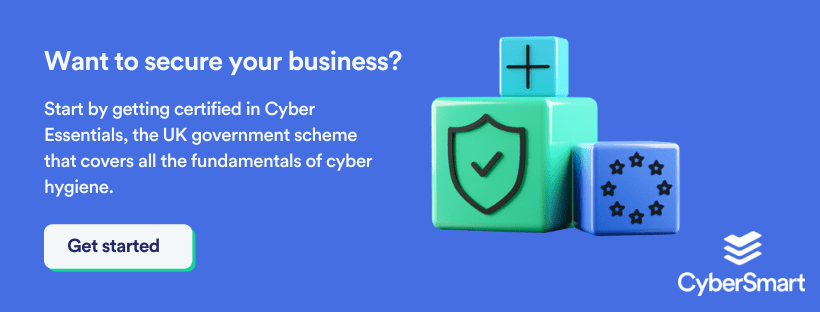Cyber Essentials certification is becoming ever-more important to the healthcare industry, particularly for those firms looking to work with the NHS.
So we sat down with Kim-Lisa Gad, Governance, Risk and Compliance Manager at Vula Mobile to discuss how CyberSmart has helped the business complete Cyber Essentials Plus certification.
Vula is a medical referral app and online platform that makes it easy for primary healthcare workers to get advice from and refer patients to specialists.
CyberSmart: What security challenges have you faced as a business?
Kim: Like many businesses – even those with good physical, technical and administrative security measures in place – it’s often a challenge to reassure customers and partners that their data is protected and our organisation is secure.
The Cyber Essentials Plus certification has allowed us to demonstrate to customers and partners that we take security seriously. And, that we’re continually improving and verifying that our security processes are effective and well managed.
CyberSmart: What prompted you to get Cyber Essentials Plus certification?
Kim: Initially, we were required to get Cyber Essentials Plus to apply for a business tender. However, since then, Cyber Essentials Plus has helped us obtain and move forward with other contracts. Being able to demonstrate our security measures to current and potential customers has proved invaluable.
The Cyber Essentials Plus certification offered through CyberSmart is an absolute necessity for any business that wants to validate its security commitments.
CyberSmart: How easy was the process from initial enquiry to certification?
Kim: The process was exceptionally quick and seamless, from our initial contact with James (Direct Sales Manager at CyberSmart) to our audit with Glen (CyberSmart’s Head of Cyber Audit) and obtaining our certification.
The team at CyberSmart were always on hand with information and advice, making the whole process much less stressful. It was also wonderful that they were able to do everything remotely as we are based in South Africa.
CyberSmart: How long did the process take?
Kim: The initial questionnaire for Cyber Essentials took around a week to complete. We had our first response back requesting more information on three questions within a day of completing it. I provided the information the same day and we were granted certification later that afternoon.
We then started Cyber Essentials Plus certification two weeks later, preparing ourselves for the online audit. The audit took around three hours; Glen was exceptional in helping us prepare and very thorough in his assessment. We received our Cyber Essentials certification the same day as the audit which was a very efficient turnaround.
CyberSmart: How has Cyber Essentials Plus helped your business?
Kim: It’s proved an invaluable way of proving to customers, partners and prospects that our security is effective and follows best practices. Certification has also made the process of submitting tenders and business documentation much easier. The certification itself answers many of the questions we’re asked in potential business agreements.
Our customers, partners and prospects have really appreciated the additional assurance that certification provides.
CyberSmart: Have you noticed any change in your relationship with customers, suppliers, or prospects since getting certified?
Kim: Our customers, partners and prospects have really appreciated the additional assurance that certification provides. What’s more, their trust in how we manage our business and the services we provide has also increased.
We find once we’ve submitted our Cyber Essentials Plus certificate to other businesses, they’re generally satisfied and don’t require any further proof of our commitment to security. The certificate provides all the proof they need.
CyberSmart: Would you recommend Cyber Essentials Plus to other businesses like yours?
Kim: Most definitely. The Cyber Essentials Plus certification offered through CyberSmart is an absolute necessity for any business that wants to validate its security commitments. And, it’s a great way to assure customers and business partners that your organisation is secure.
Finally, it’s also a very methodical approach to ensuring your security measures are well-thought-out, executed properly, and mitigate cybersecurity risks.
Considering Cyber Essentials Plus for your business? Click here to find out why CyberSmart is the UK’s leading provider of Cyber Essentials certification.


